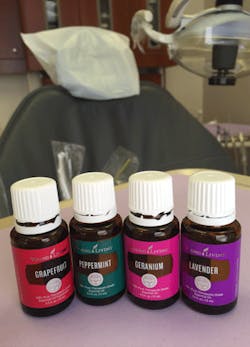Thursday Troubleshooter: A battle over the use of essential oils in the dental office
Nearly everyone has problems and concerns on the job, and sometimes you're just too close to a situation to solve something yourself. Share your concerns with Team Troubleshooter, and the experts will examine the issues and provide guidance. Send questions to [email protected].
_______________________________________________________________________________________________________________________________________________
QUESTION: My coworker complained that my oil diffuser made her nauseous and gave her a headache. She says she’s very “sensitive,” but she complains often about a lot of things. She said she could show me a doctor's note about her sensitivity. I’ve switched to a different oil. Now we’re waiting to see if this makes her nauseous. I have a problem giving up the diffuser because our patients like the scents, which mask the dental office smell. What would you recommend I do?
Have you taken everyone’s medical history to see if they’re allergic to specific oils, including your patients? They can have severe negative reactions and not even be aware of their allergy or sensitivity. Therefore, your coworker may be labeling this as a “sensitivity” without any origin on her part.
In addition, there’s the emotional part of the medical intake form that has to be taken into consideration when you use essential oils. The “sensitivity” could be caused from a bad memory association. Don’t forget the skin contact from the vapor from the diffuser. Using essential oils in the dental office without proper training is an added liability that the dentist does not need. Just because someone likes a scent does not mean that it’s good for them. As an aroma scientist, I know that this is something that’s extremely important in protecting patients and coworkers.
Dental professionals don’t like anyone who’s unqualified dabbling in their scope of practice, and the same goes for aroma scientists. We know that no one should play with essential oils in the dental office thinking they know what an oil says on each single note. (An example is an individual oil such as lavender.)
Enjoy and play with the oils on yourself and your friends, but not in the dental office. With all due respect, you must remove the diffuser, and it’s not just for this coworker; it’s for the safety of your patients and the liability of the dental office.
Editor's note:Oraspa is the only training course that has the education and Dental Essential oils designed to be used specifically and safely in the dental office.
_______________________________________________________________________________________________________________________________________________
ANSWER FROM JAMIE COLLINS, RDH, CDA, educator at the College of Western Idaho:
I can relate to having coworkers and patients who are sensitive to different smells, and like you I enjoy having a scent to mask the odor of dental life. On the other hand, many people do have legitimate sensitivities to certain smells that cause headaches, sneezing, or congestion, all of which are miserable to work with.
There are other options of scents to try that may not be as strong as what you’re using. For example, Roman chamomile is a floral scent, and like lavender it can have a calming effect. Bergamot is a citrus oil that has uplifting qualities without being too strong or overwhelming to the senses for most. Neroli is an oil that is derived from the orange blossom, with a light floral citrus scent that’s clean and slightly flowery.
For some people, the smell of something citrusy versus flowery is more acceptable to the senses, and it will still smell clean and mask the odor of the dental office. To accommodate people who are sensitive to smells, try one that is considered milder than most. I would try to work together with your coworker to find a scent she can tolerate, and this will make both of you happy. If no decision can be reached, the decision to use candles and oil diffusers lies with the doctor.
_________________________________________________________________________________________________________________________________________________
RECENT THURSDAY TROUBLESHOOTERS
• Office manager's 'nagging' causes dental assistants' tension
• Can dental practice charge interest for patients who take months to pay?
• Insurance companies ‘downcode’ and confuse dental practice
Don't be shy! If YOU have a tough issue in your dental office that you would like addressed, send it to [email protected] for the experts to answer. Remember, you'll be helping others who share the same issue. Responses will come from various dental consultants, as well as other experts in the areas of human resources, coding, front office management, and more. These folks will assist dental professionals with their problems on DentistryIQ because they're very familiar with the tough challenges day-to-day practice can bring. All inquiries will be answered anonymously each Thursday here on DIQ.






